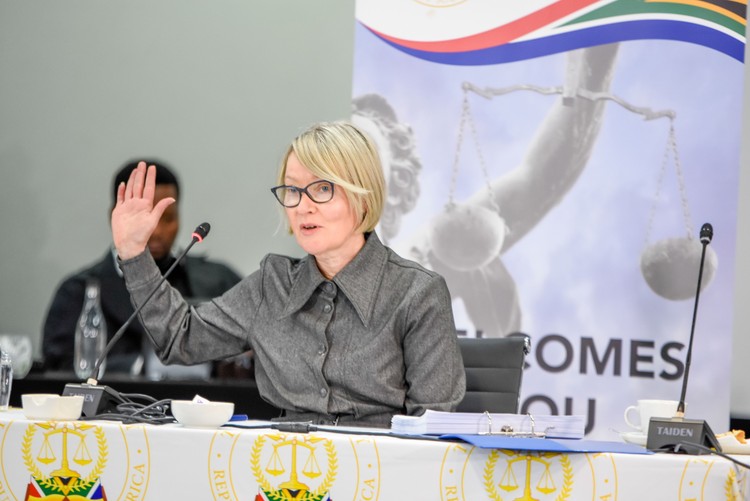
1 July 2025
Vetten takes the oath before testifying at the Judicial Conduct Tribunal on Monday. Photo: Office of the Chief Justice
Judges’ secretary Andiswa Mengo was coerced into engaging in sexually explicit WhatsApp messages with Eastern Cape Judge President Selby Mbenenge, sexual harassment and gender violence expert Dr Lisa Vetten said on Monday.
Vetten was testifying before the Judicial Conduct Tribunal probing Mengo’s allegations of sexual harassment against Mbenenge. If found guilty, he could face impeachment.
Mengo claims the sexual advances from Mbenenge were unwanted.
Mbenenge admits to sending some of the messages, but he says it was consensual.
He has specifically denied Mengo’s allegation that he sent her a picture of his penis and asked her for oral sex in his chambers.
The reams of WhatsApp messages, which contain explicit emojis, have been under the spotlight since the tribunal first sat in January this year.
On Monday, it was Vetten’s turn to give her expert opinion on whether or not the WhatsApp exchanges constituted sexual harassment.
Vetten said it was clear that Mbenenge, as the judge president of the province, wielded power and influence.
Generally, workplaces were hierarchical, and while Mbenenge was not Mengo’s direct boss, she was a secretary, and “saying no to someone who is your senior is difficult” because of possible consequences including victimisation.
“There are also questions of influence. Who is more likely to be believed … whose word would carry more weight,” she said.
Any perceived consent by Mengo to the messaging through sexual banter was not real consent, but coercion, she testified.
She said she had examined the exchanges between the pair on 47 days spread over seven and a half months in 2021. There were 837 messages, 526 from Mbenenge and 311 from Mengo.
Mengo had only initiated the conversation five times, and when she did, it was always around neutral, mainly work-related issues. She never asked him for photographs of himself.
In contrast, Mbenenge had relentlessly - at least 12 times - requested her for photographs, including topless ones, in the after-hours exchanges. He had given her no explanation for why he wanted them, which in itself was an abuse of power, said Vetten.
Regarding the fact that Mbenenge appeared to have deleted some of his messages, Vetten said: “This is because he knows it was inappropriate. He didn’t want people to see.”
On Mengo’s response to the messages, she said, Mengo was using different strategies to communicate a reluctance and unwillingness. “She used deflection, evasion, and deferral. She used silence. She also used accommodation and active resistance.”
She often changed the subject. “She says, I am busy, I am ironing, I am cooking, I am studying. And then he returns to the conversation with sexual innuendo,” said Vetten.
“He asked repeatedly, which is your favourite position, and she either tried to divert the conversation or did not respond.”
Vetten said Mengo had eventually referred Mbenenge to a quote in the Bible and had been clear that they were not going to be intimate. In response, Mbenenge had sent her a banana emoji saying, “I was going to give you this”.
“He didn’t seem to be taking no for an answer,” Vetten said.
Mengo came across as “reluctant and unenthusiastic” throughout most of the conversations.
Vetten explained that there was no “perfect victim”. In an ideal world, all women should immediately stand up for themselves and say “stop it”. But one has to take context and “human frailty” into account.
Advocate Muzi Sikhakhane, representing Mbenenge, said cross examination would take “days and days”.
Sikhakhane praised Vetten as an “intellectual” who did important work for women, but accused her of being biased and ignoring “chunks” of evidence pointing to Mengo’s complicity.
Vetten’s expert testimony could not be trusted, he suggested.
Vetten conceded that language and culture (both Mengo and Mbenenge are Xhosa speakers) were important issues to consider in any analysis and she had only relied on the translation of the messages.
“So your analysis may be mistaken,” Sikhakhane asked.
“It’s certainly possible,” Vetten answered.
The tribunal, chaired by retired Judge Bernard Ngoepe, is expected to sit until 11 July.